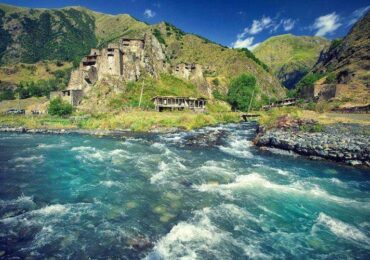The region of Khevsureti is north of the capital and shares a border with Chechnya, Russia. Although, due to its dramatic landscape it is by no means an easily-accessible area, this is also what makes it so special and authentic. Besides the nature, there are also amazing cultural monuments to discover.
To fully understand the culture of Khevsureti, it is a good idea to view a video or live show of the famous Khevsuruli warrior dance. Since the region was always besieged enemies, fighting is well-established in its traditions. The villages were also built to protect themselves from attacks.

While the whole region is amazing to explore, the three most popular places to venture are Shatili, Mutso and the Abudelauri Lakes.
What to see in Khevsureti:
- Shatili and Mutso – Shatili is 1,400 meters (4,600ft) above sea level and is famous for its towers and fortress settlement. Since it is very close to the border, it has protected the region and country from invaders many times throughout its history. The stone towers were both for protection and living. It is possible to stay the night inside some of the towers. If you are looking for a darker adventure, visit the tombs of plague victims. Your next destination should be Mutso, which is only 12km away. You can walk (2-4 hours) or drive (about 30 minutes). It is one of the most untouched villages of Khevsureti, and boasts unbelievable panoramic views. A tour of Shatili and Mutso takes around 2 days.
- Abudelauri Lakes – You can incorporate the tour of the Abudelauri Lakes into a larger Khevsureti tour, or take a day trip from Tbilisi. From Tbilisi, you will need to drive to Roshka and afterwards either hike or ride a horse. The stunning lakes are at a height of 2,812 meters (9,226ft). They are sometimes called the Colorful Lakes, since each has a distinctive blue, green and white hue respectively.
Best time to visit Khevsureti: Summer.
How to get to Khevsureti:
- Marshrutka (minibus) to Barisakho (100 km), then transfer to another marshrutka
- Take a direct shuttle to Shatili (5 hours).
